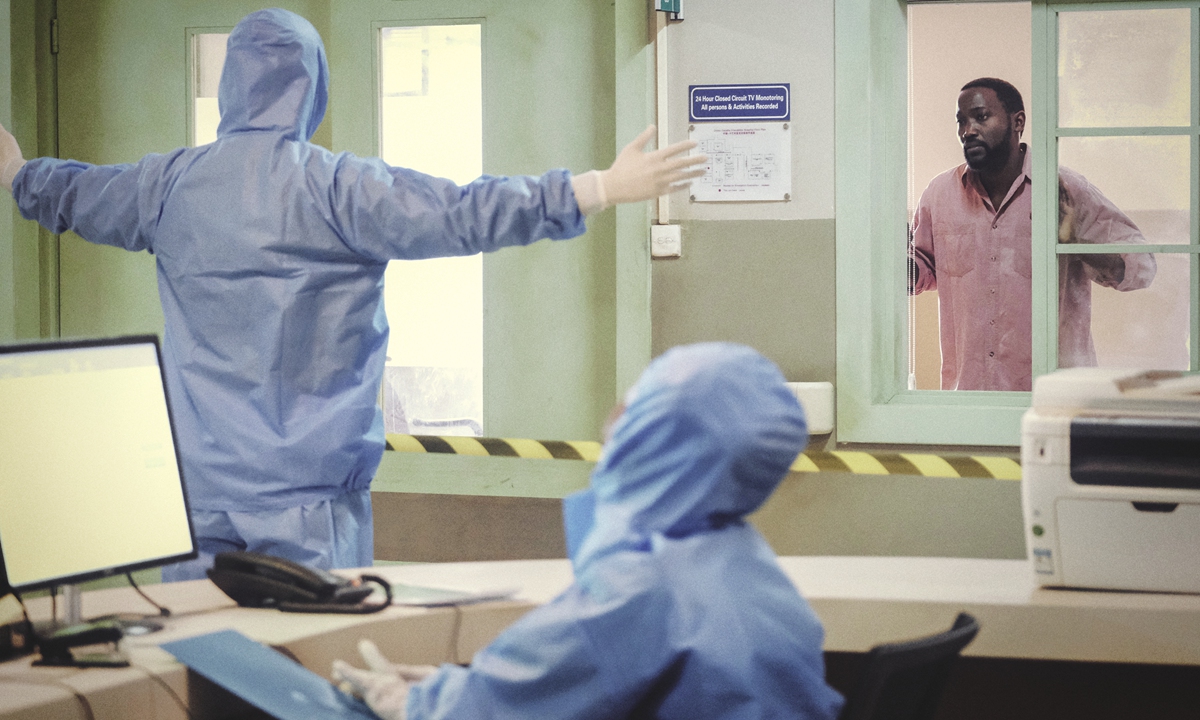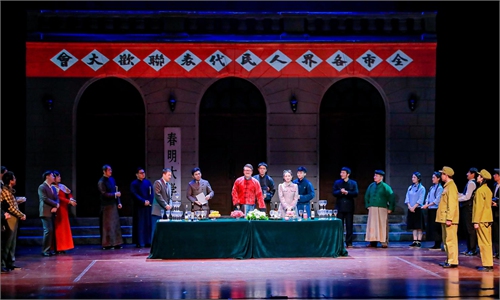ARTS / FILM
The story of the Chinese medical team fighting against Ebola in Africa
On the Front Lines

Promotional material of Ebola Fighter Photo: Courtesy of Tencent Video
At a time when the world is still being terrified by the ongoing COVID-19 pandemic, especially the sudden outbreak of the Omicron variant, many people's thoughts turn to one of the most deadly viruses in the world, which has taken thousands of lives in West Africa since 2014: Ebola.
Few people know that a number of Chinese medical teams worked thousands of kilometers away from their homeland on the frontline of the fight against the deadly virus in countries like Sierra Leone, Guinea and Liberia, saving many people through their devotion and professional skills and finally winning the war against Ebola. Now their fearless stories are adopted in a new TV series that is set to hit Chinese streaming giant Tencent Video on Wednesday - Ebola Fighters.
"Their fights and great stories can't be forgotten," director Yang Wenjun told the Global Times on Monday.
"All of the cast members hope that the upcoming series can remind people of their careful service and selfless devotion as well as their spirit of 'saving the sick and healing the wounded despite the hardship.'"
The compassion of doctors
Set in the fictional West African country of Cabalia as it struggles with a sudden outbreak of the Level 4 virus Ebola, the TV series starring Chinese actor Luo Jin and actress Mao Xiaotong follows the Chinese medical team as they work hard to contain the virus and help the infected.
The preparation work and research for the show took show producer Mao Yi and the writers three years, during which time they poured through hundreds of hours of footage and millions of pages of documents containing interviews with more than 100 top medical experts like Chen Wei, who led the team that developed the world's first Ebola vaccine in 2014 and also the one behind China's first COVID-19 vaccine.
"Before that, we didn't know that our doctors had done so much and so long over the past 60 years on this continent that is so far, far away," said Yang.
"Being able to move all of their stories to the small screen has been something we all want to do and should do," Yang added.
"We followed a strict real timeline and many characters in the show are derived from real people, not just those who worked in 2014, but many more who contributed over the decades."
True stories, true emotion
For Beijing doctor Cao Guang, who spent two years in Guinea from 2012 to 2014, it was difficult to watch the death of his good friend and coworker, Doctor Gassimou Bangoura, from Ebola depicted on the screen.
"As a witness, I felt very touched by watching this series. It contains a lot of details. Those things feel like they just happened yesterday," Cao said at a pre-screening event for the show on Monday.
The friendship between Doctor Zheng Shupeng (Luo Jin), who is partly based on Cao, and Gassimou, based on and named after the real-life doctor, is an important thread running through the entire series. The two once argued about whether to hug a patient out of concerns of infection, with Gassimou stating that it was a way to offer them warmth and hope.
"Hope and warmth is something that we all need, especially during a time when your life is being ruined by a deadly virus. That is something we hope to deliver to everyone," Yang told the Global Times, noting that they worked hard to keep the differences in culture and attitudes toward death in the series.
The set was also an important way to stay true to life. The production team made a replica of the Chinese team's mobile bio-safety Level 3 laboratory and even their BSL4 lab with the guidance of experts.
"Meeting the high standards and requirements for water and waste removal was difficult. We had relevant experts supervise our design and construction throughout the process. We can say all the parts visible on the screen are the same as the real P3 and P4 labs, from precaution measures to established protocols for all procedures," Mao noted.
Walk into Africa
A scene in which one of the Chinese doctors takes off his mask to perform CPR on a child hurt in a traffic accident touched Cheng Tao, former director of the African Division of China's Ministry of Foreign Affairs.
"Knowing that he may be a patient infected with the Ebola virus, he still took off his mask. All he wanted to do was to save that child," said Cheng, who had worked in Africa for decades.
"China-Africa cooperation needs more attention and publicity, especially medical cooperation, which shows China's responsibility as a great power and the deep friendship between China and Africa," he told the Global Times.


